
Concrete Pools vs. Fiberglass Pools: An Honest Comparison
Fiberglass Pool Information | Swimming Pool FAQs | Concrete Pool Information
Time for a radical statement: fiberglass pools aren’t for everyone.
“But don’t you, like, specialize in fiberglass pools? Like, exclusively? I thought River Pools® was synonymous with fiberglass pools. Why would you say they’re not for everyone! I'm so confused!”
Well, here’s the thing. Despite being in the inground pool world for several decades, with most of that focused 100% on fiberglass, we don’t want to tell you that fiberglass is the best thing for you. Especially if we know that may not be the case.
So, today we want to share all of our knowledge with you, the homeowner/swimmer-extraordinaire at the end of the day, so you can make the best decision for you and your family...even if that means not choosing a fiberglass pool.
Although there are three main types of inground pools to choose from, two of them are more closely related in cost these days. We’ll save vinyl liner pools for another day and focus on how concrete pools and fiberglass pools compare in the following areas:
- Cost (initial and lifetime)
- Customization
- Installation time
- Interior surface texture
- Durability
- Hands-on maintenance
- Algae removal
- Chemicals and electrical energy

Is a concrete or fiberglass pool better for me?
While concrete pools can typically be more expensive to install and maintain over time, they are highly customizable in terms of shape and finish materials. Fiberglass pools, on the other hand, tend to be a bit less expensive to install and maintain over time. And although they are not customizable in terms of shape, they do feature many popular features that may be considered customized upgrades for a concrete pool.
So, which one is better for you? Let's get into the nitty-gritty below and help you gain a deeper understanding of each pool type.
It is very likely that you'll find costs for concrete pools beginning at $65,000*, and they can require more expensive long-term maintenance. They're highly customizable, and many customers report they take about 3–6+ months to install. Based on our experience, fiberglass pools typically begin at least $55,000* and can require less maintenance by comparison. They're pre-built on existing molds and can offer the fastest installation process. Keep in mind that pricing of pool types will vary depending on the size pool you choose and the area you live in.
* The beginning price represents a base package which typically includes permits, excavation, the pool shell/structure, plumbing, filtration, sanitation, and enough water to fill the pool. It typically excludes final grading, decking/patio, fencing, accessories, or electrical work.
Cost (initial and lifetime)
Fiberglass
Fiberglass pool base packages typically start at $55,000 for a small pool that is approximately 10'x20' in size. Installers commonly include the following in their base packages: permits, excavation, the pool shell, backfill material, plumbing, filtration, sanitation, and enough water to fill the pool.
The base package typically excludes final grading, decking/patio, fencing, accessories, or electrical work.
According to builders from around the country, homeowners often invest around $70,000–$135,000 for a turn-key project, which includes the base package, options, accessories and any other items or work required to meet local building codes. It's not likely you'll find total costs below $70,000 for a turn-key project, but exceeding $135,000 is quite common depending on the complexity of the project, finished materials, and upgrades.
Long-term, your only serious maintenance expenses will be in chemicals and electricity. We think you'll find that maintenance will cost far less than that of a concrete pool over a 10-year period.
Concrete
Concrete pool construction usually starts at $65,000 or more for a pool that is approximately 10'x20' in size.
You might expect to see base packages include permits, excavation, the pool's structure (rebar and concrete), plaster finish, plumbing, filtration, sanitation, and perhaps enough water to fill the pool for the first time.
The base package most likely will not include final grading, decking/patio, fencing, accessories, or electrical work.
Concrete pools typically require acid washing, refinishing, and energy usage. Over the life of a concrete pool, maintenance typically costs far more because of the lifespan and replacement cost of the pool's finished surface.
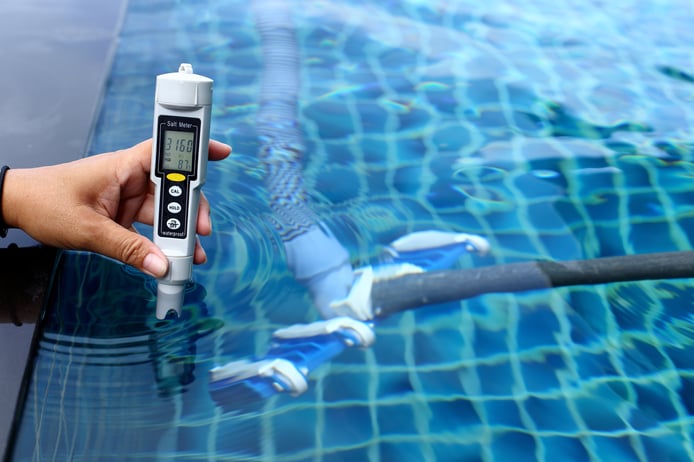
Conclusion
The upfront cost for both are within a similar range, however concrete pools tend to cost more in the long run. This is one reason many pool owners say they chose fiberglass.
Customization
Fiberglass
Fiberglass pools typically range from 10-16 feet wide, and 20-40 feet long, and can be up to 8.5 feet deep. They’re created from pre-designed molds. You will be limited to shapes and sizes that are pre-determined.
Even outside of the size restrictions, you can customize your pool to any aesthetic with water features, tanning ledges, tiles, colorful lights and finishes, and outdoor living spaces.
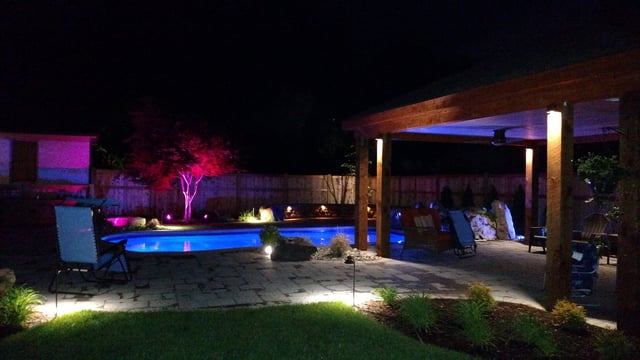
Concrete
If you want full control over the size and shape of your pool, concrete is your better option. It costs more for each square foot, of course, but you can design your pool to be any shape you like to suit your specific needs.
Want a pool shaped like a guitar or a cowboy boot? You can have that with concrete!
By the way, if this is the route you go, just know you won't be the first with a pool shaped like either of the aforementioned.
Conclusion
Fiberglass pools and concrete pools can be equally gorgeous, but concrete pools are almost unlimited in their size and shape options. Many concrete pool owners indicate customization was a priority when choosing a pool.
Installation time
Fiberglass
Fiberglass pool shells are manufactured off-site and transported to your backyard.
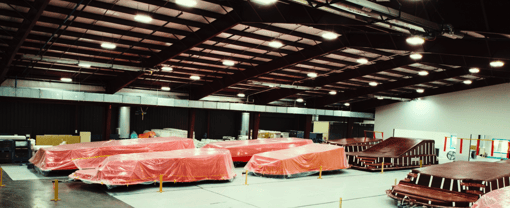
According to installers, after the pool arrives (and with ideal conditions) it take as few as 2 days to dig the hole, set the pool, install the plumbing, and fill it with water. They indicate it typically takes another several weeks to complete the patio or pool deck, and additional work to bring your outdoor living space to life.
Ask your installer how long they would anticipate each step of the project to take.
Concrete
Constructing a concrete pool using the gunite process can take around 3 to 6 months. This may seem like a long time to wait for the backyard of your dreams, but it may be worth it, as long as the end result exactly what you envisioned.
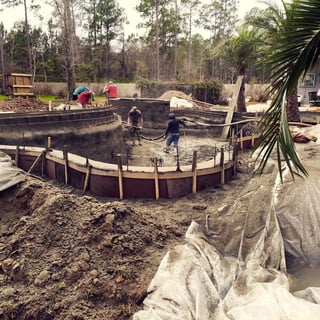
Conclusion
You only see the installation part of the fiberglass pool process, not the manufacturing of the pool itself, and that installation takes weeks instead of months. Many pool owners who wanted the shortest potential installation timeline chose fiberglass.
Interior surface texture
Fiberglass
The interior surface of a fiberglass pool is created with gelcoat. It’s smooth to the touch, pleasant to walk on, and not abrasive if you bump against it. (We put that last part in because you may have a sister-in-law who's a bit competitive when the volleyball comes out.)
Steps or tanning ledges are designed to have an anti-slip texture, but even that’s not rough, and pool toe shouldn't be a worry.
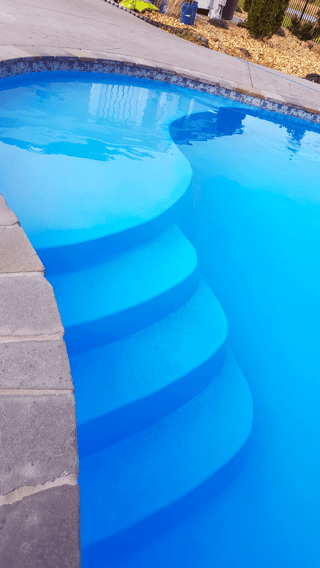
Concrete
Plaster is typically used to create the interior surface of a concrete pool; compared to the finish of a fiberglass pool, plaster has a sandpaper-like feeling. The surface can cause scrapes and often is the culprit when a swimmer has ‘pool toe’. There are other finish material options, like exposed aggregate or tile, which is the smoothest finish but also likely the most expensive.
Conclusion
A concrete pool owner would likely need to invest much more to achieve a pool surface as smooth as fiberglass. On the other hand, a fiberglass pool's surface feels smooth by default. Pool owners say the surface of the pool was an important factor when choosing the best pool type for them.
Durability
Fiberglass
Both the gel coat finish and the pool structure itself are super durable. This makes them ideal for all North American climates and for those who plan on having pets enjoy the pool as well.
But it's important to note that any pool owner can ruin the surface finish of their pool with improper pool chemistry. This is true regardless of the sanitation system you choose (traditional chlorine, salt chlorine generator, UV, mineral, ozone, or any other system or combination of systems)
Concrete
The structure of a concrete pool is also incredibly durable.
All interior finishes for concrete pools, including basic plaster, are strong enough that you don’t have to worry about damage from toys, dogs, or tree branches. However, you will need to plan to replaster the pool every so often. Pool builders indicate this is typically needed every 10–15 years, including replacing the waterline tile.
Again, poor water chemistry can degrade the finish prematurely, leading to an early surface replacement.
If you use a salt chlorine generator, the dissolved salt in the water will shorten the life expectancy of plaster-based interior finish materials. Salt water doesn’t affect tiles, but it will likely have a negative effect on the adhesive material and grout.
Conclusion
Both surfaces are strong and durable, but concrete pool surfaces will need to be replaced as mentioned above. Many pool owners indicate this was an important factor that led them to choose a fiberglass pool.
Hands-on maintenance
Fiberglass
The super smooth gel coat surface adds ease to routine maintenance. Brushing and vacuuming the pool is easier because algae, dirt, and debris do not readily adhere to the surface, making maintenance tasks easier.
The gel coat also doesn’t affect the water’s alkalinity or pH, so you rarely have to add acid to balance the water. You do still need to test your water chemistry each week, at a minimum. Bonus points for you if you test several times a week.
When it comes to dealing with algae (and unfortunately, you will at some point) the good news is that it doesn't readily stick to a fiberglass pool's smooth gel coat surface. The gelcoat has only microscopic pores, so brushing algae off the pool's surface should be a breeze.
Concrete
The surface of a concrete pool lends to algae, dirt, and debris finding a way to grab ahold. This is particularly true for a concrete pool with a traditional plaster finish. The porous nature of cured plaster requires rigorous brushing at times.
Concrete has many pores and cavities, which can invite algae, and make removal a challenge.
You also need to clean the entire surface of the pool with a steel brush at least once a week to remove any surface algae.
Conclusion
Although no pool is maintenance-free, fiberglass pools tend to require less weekly maintenance, whereas you’ll need to monitor concrete pools much more closely to make sure they stay squeaky clean. Many pool owners indicate ease of maintenance was a high priority when choosing the best pool type for them.
Chemical Usage
Fiberglass
The gelcoat also doesn’t affect the water’s alkalinity or pH, so you rarely have to add in acid to balance it. In addition, calcium is not needed to maintain proper chemistry in a fiberglass pool. This not only means your supply shopping list is shorter, it also may even be a bit cheaper because liquid chlorine is generally less expensive than chlorine in granular or tablet form, both of which contain calcium.
You do still need to test your water chemistry each week, though. Bonus points for you if you test several times a week.
Concrete
The surface of a concrete pool can increase the water’s alkalinity, which can lead to challenges with maintaining proper pH levels. You’ll find that you’ll need to apply muriatic acid more often. In addition, you’ll need to closely monitor calcium levels in your pool. If this gets too low, the calcium within the plaster will leech out, leading to the need to replaster the pool much sooner.
Conclusion
Concrete’s higher maintenance needs often translate to higher chemical usage. Many pool owners indicate this was an important factor that led them to choose a fiberglass pool.
Which should I choose?
Only you know your priorities for your new pool. Consider these different characteristics as you determine the best fit for you and your family. Maybe the pool needs to fit your specific aesthetic and maintenance is not as much of a concern. Or maybe you’d prefer less maintenance over customization.
If you're still on the fence, but you'd like to get a clearer idea of your perfect pool, try our Pool Type Selector quiz. You'll get a customized recommendation with just 10 quick clicks. Try it out below:
Concrete pools might be a good fit for you if you:
- Have a budget of $70,000 or more
- Need a custom shape or depth, like an L shape or 9-foot deep end
- Don't mind spending time and/or money maintaining the pool down the road
- Are unbothered by rougher texture on your feet
Fiberglass pools might be a good fit for you if you:
- Have a budget of $70,000 or more
- Don't need a pool larger than 16’x40’
- Don't mind choosing from a variety of pre-determined shapes
- Are seeking less maintenance (sadly, no pool is maintenance-free)
- Want a pool with lower long-term costs
- Want a quicker, installation
.png?width=600&height=442&name=RP%202023%20Pool%20Comparison%20Graphic_%20(3).png)
Typically we see that fiberglass pools are installed faster, cost less in the long run, and are easier to maintain.
The River Pools brand offers both freeform and linear fiberglass pool designs, which are available through independent installers across the country. If you think a fiberglass pool might be the right choice for you, we want to answer any questions you have!
Up Next:
7 Pool Extras That Won't Break the Budget
Should You Buy a Fiberglass Pool? (Infographic)
Editor's note: This blog article was updated on November 16, 2020.
Editor's note: This article was updated on September 12, 2023.
Editor's note: This article was originally written by Holly Jender and has been updated on December 11, 2023, with current information. River Pools is a brand of inground fiberglass pools produced via the River Pools division of the manufacturing facility in Fortville, IN. While our expertise is in fiberglass pools, we have a network of expertise relating to all things inground pools. Our own collective experience from over the years spans manufacturing, project design, installation, and pool service. We often tap into this knowledge base and share information freely with homeowners, just like you, who are considering having a swimming pool installed in your backyard.






